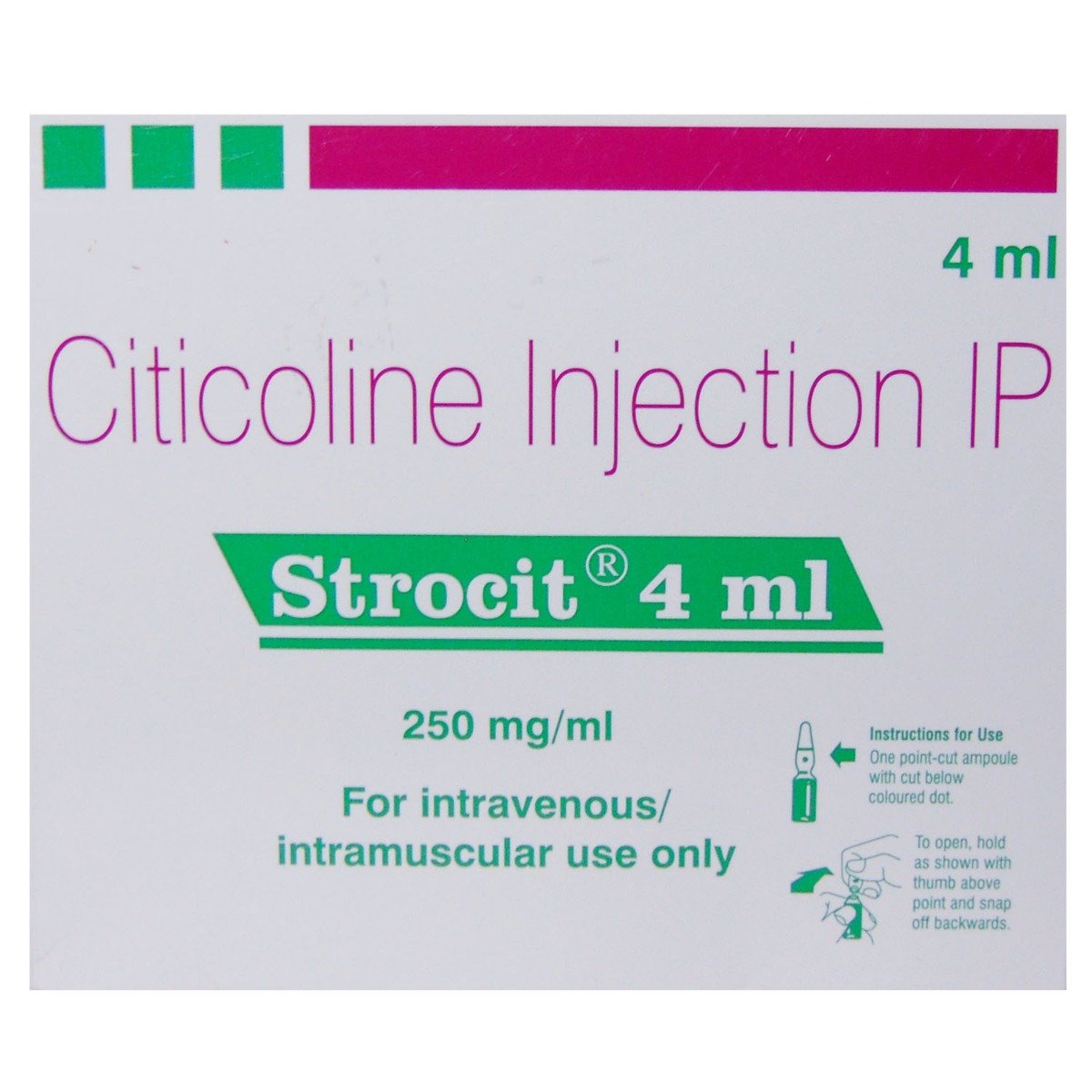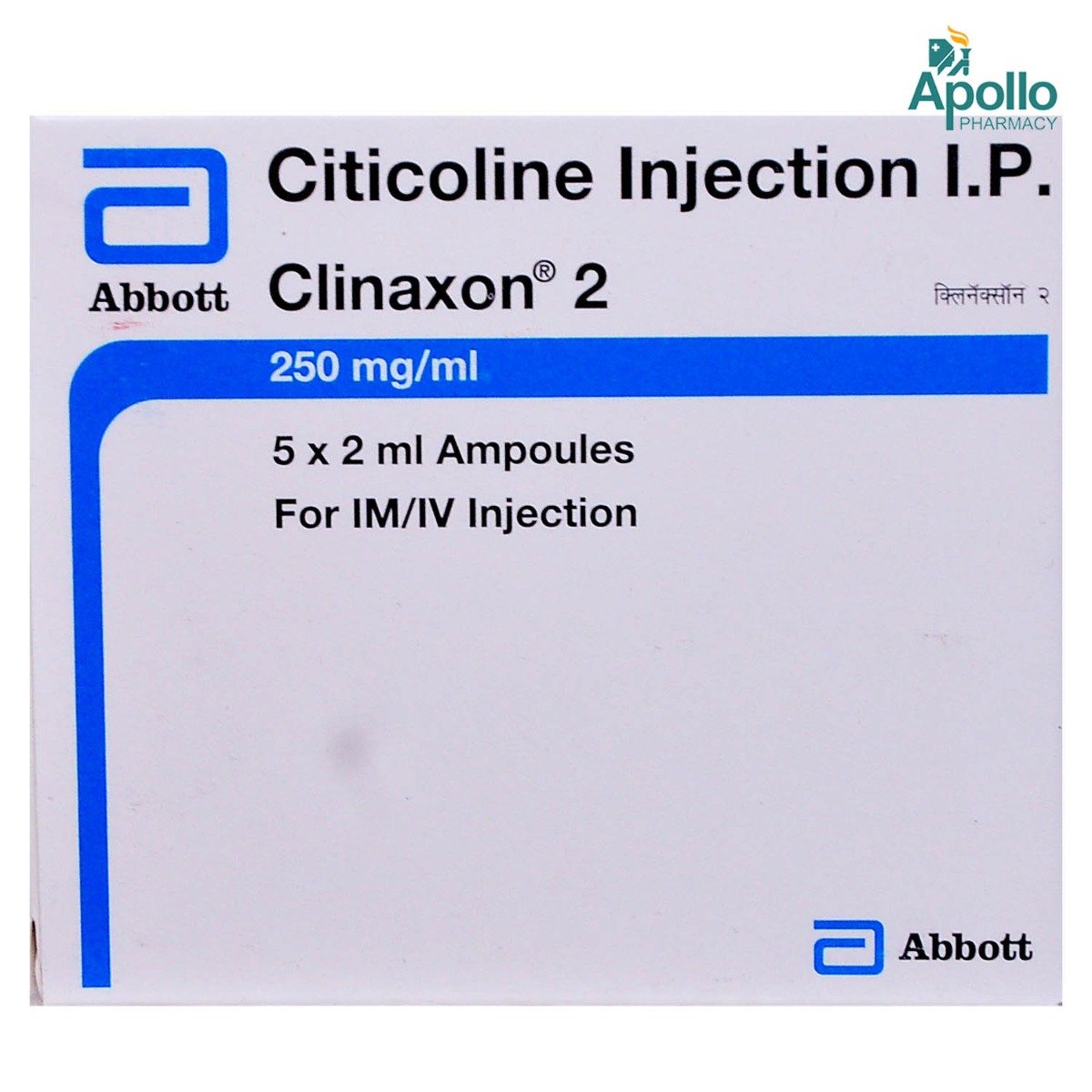Neucholine 250Mg Inj 2Ml
MRP ₹105
(Inclusive of all Taxes)
₹15.8 Cashback (15%)
Provide Delivery Location
Online payment accepted
 Prescription drug
Prescription drugWhats That
Composition :
Manufacturer/Marketer :
Consume Type :
Expires on or after :
Return Policy :
About Neucholine 250Mg Inj 2Ml
Neucholine 250Mg Inj 2Ml belongs to a group of medications called 'psychostimulants' used to treat disturbances of consciousness resulting from head injuries, brain operation and acute stage of cerebral infarction (stroke) in adults.
Neucholine 250Mg Inj 2Ml contains 'Citicoline', which stabilizes cell membranes by increasing phosphatidylcholine and sphingomyelin synthesis and by inhibiting the release of free fatty acids; thereby, it enhances recovery in patients who had their consciousness disturbed by a head injury or any other brain-related problem and who underwent surgery.
In some cases, Neucholine 250Mg Inj 2Ml may cause injection site reactions, rash, insomnia (inability to sleep), nausea, feeling of warmth, anorexia (loss of appetite), convulsions, transient diplopia (double vision) and dyspnea (shortness of breath). If these side effects persist or worsen, consult your doctor immediately.
Neucholine 250Mg Inj 2Ml is not recommended to be used in patients with over-functioning of the sympathetic nervous system or who have a history of hypersensitivity to Citicoline. If you are pregnant or breastfeeding, please inform your doctor so that your doctor will weigh the benefits and any potential risks before prescribing it to you. Neucholine 250Mg Inj 2Ml may cause irregular body movement and double vision; thus, avoid operating machinery or driving after taking this medicine.
Uses of Neucholine 250Mg Inj 2Ml
Directions for Use
Key Benefits
Neucholine 250Mg Inj 2Ml contains 'Citicoline’, a psychostimulant or nootropic drug used to nourish and minimize damage to the nerve cells in various conditions associated with the brain. It increases the activity of the central nervous system (brain and spinal cord) and regenerates nerve cells by promoting the synthesis of phospholipids in the brain. it improves recovery in patients who had their consciousness disturbed by a head injury or any other brain-related problem and who underwent surgery.
Storage
Drug Warnings
Let your doctor know if you are allergic or hypersensitive to any medicines. Inform your doctor if you are suffering from kidney, liver, or heart diseases. Neucholine 250Mg Inj 2Ml should not be used in conjunction with meclofenoxate or clophenoxate-containing medications. Notify your doctor about your medical history and medications in order to rule out any potential negative effects.
Diet & Lifestyle Advise
- Include green, leafy vegetables and other non-starchy vegetables (tomatoes, broccoli, cauliflower, etc.) in your diet.
- Strawberries, blueberries, blackberries, and nuts may help reduce inflammation in the brain.
- Use olive oil for cooking purposes. It contains healthy fats that promote brain health.
- Eat whole grains such as oats, quinoa, and brown rice that are rich in nutrients.
- Opt for fish oil or eat fish (preferably fatty fish like salmon, sardines, trout, and tuna) at least once a week. They are rich in omega-3 fatty acids essential for the brain's normal functioning.
- Avoid fried, processed, and packed foods.
- Quit alcohol intake and smoking.
- Exercise regularly.
Side Effects of Neucholine 250Mg Inj 2Ml
- Rash
- Insomnia
- Numbness of paralyzed extremities
- Nausea (feeling of sickness)
- Feeling of warmth
- Convulsions (irregular movement of the body)
- Anorexia (loss of appetite)
- Transient Diplopia (double vision)
- Malaise (discomfort or illness)
- Dyspnea (shortness of breath)
Habit Forming
Therapeutic Class
All Substitutes & Brand Comparisons
RX
Out of StockCriticoline Injection 2 ml
Dr Reddy's Laboratories Ltd
₹90
(₹40.5/ 1ml)
14% CHEAPERRX
Out of StockCeatiun 4 Injection
Bountiful Lifesciences Pvt Ltd
₹237
(₹53.33/ 1ml)
12% COSTLIERRX
Cogni-Plus 250mg Injection 2 ml
Galaxus Pharmaceuticals
₹126.5
(₹56.95/ 1ml)
20% COSTLIER
Author Details
We provide you with authentic, trustworthy and relevant information
FAQs
Neucholine 250Mg Inj 2Ml It stabilises cell membranes by increasing the production of phosphatidylcholine and sphingomyelin and decreasing the release of free fatty acids; as a result, it helps speed up recovery in patients who have had surgery for head injuries or other brain-related conditions.
Neucholine 250Mg Inj 2Ml can cause insomnia (sleeplessness). However, not everybody taking Neucholine 250Mg Inj 2Ml experiences this side-effect. If the condition persists or worsens, consult a doctor.
Neucholine 250Mg Inj 2Ml must not be administered to patients with hypertonic of the parasympathetic (over-functioning of the sympathetic nervous system) or a history of hypersensitivity to Citicoline.
Drug-Drug Interactions Checker List
- LEVODOPA
- CARBIDOPA
- CENTROPHENOXINE
- MECLOFENOXATE
Disease/Condition Glossary
Acute cerebral infarction (stroke): Stroke, also called cerebrovascular (CVA) stroke, occurs when there is a decreased blood supply to the brain due to the presence of a blood clot or leakage of blood vessels. The decrease in blood supply leads to a decrease in oxygen and nutrients resulting in the death of brain cells. This condition leads to paralysis of the face, arm, or leg, slurred speech, headache, and difficulty walking.
Head trauma: A head injury (head trauma) is any type of injury to the brain, skull, or scalp. This might range from a minor bump or bruise to a severe brain injury. Concussions, skull fractures, and scalp injuries are examples of common head injuries. The effects and therapies vary widely depending on what caused the head trauma and its severity.

Have a query?
Alcohol
Safe if prescribed
Avoiding alcohol is recommended to rule out any possibility of side effects.
Pregnancy
Consult your doctor
There are no adequate and well-controlled studies on pregnant women. Please consult your doctor. Your doctor will prescribe only if the benefits outweigh the risks.
Breast Feeding
Consult your doctor
There are no adequate and well-controlled studies on nursing mothers. Please consult your doctor. Your doctor will prescribe only if the benefits outweigh the risks.
Driving
Safe if prescribed
Neucholine 250Mg Inj 2Ml may cause irregular body movement and double vision; thus, avoid using machinery or driving.
Liver
Consult your doctor
Let your doctor know if you have a history of liver impairment/disorder. Your doctor will prescribe only if the benefits outweigh the risks.
Kidney
Consult your doctor
Let your doctor know if you have had a history of kidney impairment/disorder. In aged patients with impaired renal function, the dose should be adjusted.
Children
Safe if prescribed
Limited information is available. Please consult your doctor.













_0.jpg?tr=q-85)
